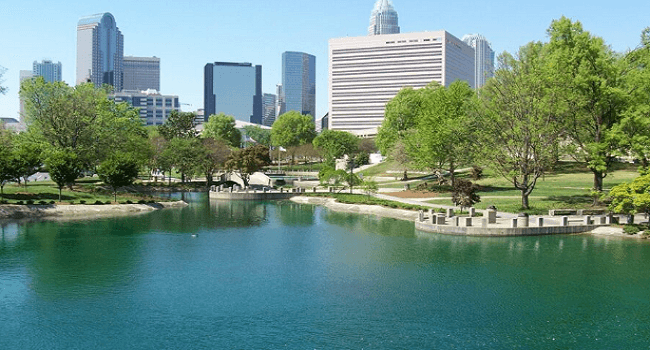Is North Carolina A Good Place to Live – North Carolina, located in the southeastern region of the United States, is a state known for its diverse geography, rich history, and vibrant culture. From the stunning Appalachian Mountains in the west to the picturesque Atlantic coastline in the east, North Carolina offers a wide array of natural beauty and recreational opportunities.
The state is home to bustling urban centers like Charlotte and Raleigh, as well as charming small towns that exude Southern hospitality.
If you’re considering a move to North Carolina, you may be wondering: Is North Carolina a good place to live?
This question is subjective, as what makes a place ideal for one person may not hold true for another.
However, in this exploration, we will delve into several factors that can help shed light on the overall quality of life in North Carolina.
We will discuss the state’s economy, job market, cost of living, education, healthcare, and recreational amenities to provide you with a well-rounded perspective on whether North Carolina may be a good fit for your lifestyle and preferences.
Pros and Cons of Living in North Carolina
Considering a move to North Carolina? Whether you’re drawn to its picturesque landscapes, vibrant cities, or renowned southern charm, it’s important to weigh the pros and cons before making a decision.
However, like any place, it also has its drawbacks that may impact your overall quality of life.
By examining both the positive and negative aspects, you can make an informed decision about whether North Carolina aligns with your lifestyle, preferences, and long-term goals.

Pros of Living in North Carolina
1. Southern Hospitality
North Carolina is renowned for its hospitable residents who embrace the values of politeness, friendliness, and community. Whether you’re a newcomer or a long-time resident, you’ll experience the warmth of Southern hospitality in everyday interactions, creating a sense of belonging and a welcoming atmosphere.
2. Easy-Going and Relaxed Lifestyle
In North Carolina, life moves at a more leisurely pace, allowing residents to savor each moment and appreciate the simple joys. The state’s laid-back atmosphere promotes a balanced lifestyle, where work and leisure find harmony, fostering a sense of well-being and contentment.
3. Good Healthcare
North Carolina boasts a robust healthcare system, with world-class medical facilities and renowned healthcare professionals. Whether you need routine check-ups or specialized treatments, you can trust that you’ll receive high-quality care and access to cutting-edge medical advancements.
4. Mouth-Watering Barbecues
Food lovers rejoice in North Carolina, as the state is renowned for its delectable barbecue culture. From tangy vinegar-based sauces in the eastern part of the state to the smoky flavors of tomato-based sauces in the western region, you’ll find a mouth-watering barbecue experience that will tantalize your taste buds.
5. Mild Winters
Say goodbye to bone-chilling winters! North Carolina offers a climate that strikes a balance, with mild winters that allow you to enjoy outdoor activities without the extreme cold. The absence of heavy snowfall and moderate temperatures create an inviting environment year-round.
6. Beautiful Beaches and Mountains
From the pristine coastline along the Atlantic Ocean to the majestic peaks of the Appalachian Mountains, North Carolina showcases an awe-inspiring range of natural beauty. Whether you prefer relaxing on sandy beaches or exploring hiking trails, the state offers endless opportunities for outdoor enthusiasts.
7. Good Job Opportunities
North Carolina’s economy is vibrant and diverse, providing a multitude of job opportunities across various industries. The state is particularly known for its thriving technology, healthcare, and manufacturing sectors, offering promising career prospects for professionals in these fields.
8. Low Housing Cost
Compared to many other states, North Carolina boasts a lower cost of living, particularly when it comes to housing. Affordable housing options are available in both urban and rural areas, enabling residents to find comfortable homes that suit their budget and lifestyle.
9. Strong Internet Connection in Cities
As technology continues to shape our lives, North Carolina keeps pace with the digital era. Major cities in the state offer reliable and high-speed internet connectivity, ensuring residents can stay connected, work remotely, and access a wide range of online services with ease.
10. The People of North Carolina are Patriotic
North Carolinians take great pride in their state and country. The patriotic spirit is ingrained in the culture, and you’ll often find residents celebrating national holidays and displaying their love for their homeland.
11. Popular Sports – Football, Basketball, Soccer, and Hockey
North Carolina is a sports lover’s paradise. The state is home to various professional sports teams, including the Carolina Panthers (football), Charlotte Hornets (basketball), Carolina Hurricanes (hockey), and North Carolina FC (soccer).
Whether you’re cheering from the stands or participating in recreational leagues, the vibrant sports culture in North Carolina offers thrilling experiences for fans and athletes alike.
12. Many Historical Sites
History enthusiasts will find themselves immersed in the rich past of North Carolina. The state is dotted with numerous historical sites, including the Wright Brothers National Memorial, the Biltmore Estate, Fort Raleigh National Historic Site, and the USS North Carolina Battleship.
Exploring these landmarks allows you to delve into the stories and events that have shaped the state’s history.
13. A Pet-Friendly State
For those who consider their furry friends as part of the family, North Carolina is a welcoming and pet-friendly state. From pet-friendly parks and beaches to a wide range of pet services and amenities, you’ll find that North Carolina is a place where pets are embraced and catered to.
14. It Has Good Arts and Entertainment Centers
North Carolina boasts a vibrant arts and entertainment scene, providing residents with a multitude of cultural experiences. From art galleries and museums to theaters and music venues, the state offers a diverse array of artistic expressions.
Read Also: Pros and Cons of Living in Arkansas
Cities like Asheville, Durham, and Charlotte are particularly known for their thriving arts communities, hosting festivals, live performances, and exhibitions throughout the year.
The Cons of Living in North Carolina
1. It Is Easy to Get Lost When Traveling
North Carolina’s winding roads and complex highway systems can make navigation a challenge, particularly for newcomers. The state’s rural areas and mountainous terrain may not always have clear signage or well-defined routes, leading to confusion and difficulty in finding one’s way.
However, with the help of modern navigation technology and familiarization with local landmarks, this obstacle can be overcome.
2. Hot Summers
North Carolina experiences hot and humid summers, especially in the central and eastern regions of the state. High temperatures and humidity can make outdoor activities uncomfortable, and residents often rely on air conditioning to seek relief from the heat.
It’s important to be prepared with proper hydration and sun protection during the summer months.
3. Limited Public Transportation
North Carolina’s public transportation system, particularly outside major urban centers, is relatively limited compared to some other states. While cities like Charlotte and Raleigh have public transit options, rural areas often have fewer choices for public transportation.
This can be a challenge for those who rely on or prefer public transit for their daily commute or travel needs.
4. Tax Rates Are High
North Carolina’s tax rates, particularly its income tax rates, are generally considered higher than the national average. This can impact residents’ disposable income and financial planning.
However, it’s important to consider the overall cost of living, including factors such as housing costs and available services, when evaluating the impact of tax rates on personal finances.
5. K-12 Education Has Room for Improvement
Like many states, North Carolina’s K-12 education system faces challenges and has room for improvement. While there are high-performing schools and dedicated educators in the state, standardized test scores and graduation rates vary across districts.
It’s important for families with school-age children to research and consider the quality of education in specific areas before making relocation decisions.
6. High Crime Rates in Certain Areas
While overall crime rates in North Carolina are in line with national averages, there are certain areas within the state that experience higher crime rates. Urban centers and some neighborhoods may have higher instances of property crimes and violent offenses.
Researching specific communities and consulting with local law enforcement can help prospective residents make informed decisions regarding safety.
7. Hurricanes
Located along the Atlantic coast, North Carolina is susceptible to hurricanes and tropical storms during the hurricane season, which typically runs from June to November.
These natural disasters can bring heavy rainfall, strong winds, and potential damage to homes and infrastructure. It is essential for residents to be prepared and have a plan in place in the event of a hurricane or tropical storm.
8. The State and Municipal Governments Don’t Get Along Well
North Carolina has had instances of strained relationships between the state government and some municipal governments.
This dynamic can sometimes result in delays or disagreements when it comes to implementing certain policies or addressing local concerns. It’s important for residents to stay informed about the political climate and be aware of potential impacts on local governance.
9. Traffic Congestion in the Big Cities
As North Carolina’s urban centers continue to grow, traffic congestion has become a common issue in cities like Charlotte and Raleigh. The influx of residents and increased commuting traffic can lead to longer commute times and frustrations on the road.
It’s important for residents to plan their daily travel accordingly and explore alternative transportation options such as carpooling or utilizing public transit when available.
Despite these challenges, it’s worth noting that North Carolina has been actively working on transportation infrastructure improvements to alleviate traffic congestion.
Projects such as road expansions, public transit expansions, and the development of bike lanes and pedestrian-friendly infrastructure aim to provide more efficient and sustainable transportation options in the future.
Is North Carolina a Good Place to Work?
North Carolina offers a favorable environment for employment opportunities across various industries. With a diverse economy that includes sectors such as technology, healthcare, manufacturing, and finance, the state provides a range of job options.
Major cities like Charlotte, Raleigh, and Durham are hubs for professional opportunities, attracting talent from around the country.
Additionally, North Carolina has a relatively low cost of living compared to some other states, which can enhance overall job satisfaction by allowing residents to stretch their earnings further.

Is North Carolina a Good Place to Buy a House?
North Carolina is generally considered a favorable place to buy a house, thanks to its relatively low housing costs compared to many other states.
Whether you’re looking for urban living or a more rural setting, the state offers a variety of housing options to suit different preferences and budgets.
From charming historic homes in towns like Asheville to modern developments in growing cities, North Carolina provides a range of real estate choices.
Read Also: Pros and Cons of Living in Missouri
Is North Carolina a Good Place to Retire?
North Carolina has become an attractive retirement destination for many individuals, thanks to its pleasant climate, affordable cost of living, and an abundance of recreational and cultural opportunities.
The state offers a range of retirement communities and senior living options that cater to different lifestyles and interests.
Additionally, North Carolina’s natural beauty, including its beaches and mountains, provides ample opportunities for outdoor activities and a fulfilling retirement lifestyle.
Is North Carolina a Good Place to Visit?
North Carolina is a fantastic place to visit, with its diverse range of attractions and activities. From the stunning Blue Ridge Mountains and the scenic beauty of the Outer Banks to vibrant cities and charming small towns, the state offers something for every visitor.
Explore the Biltmore Estate in Asheville, relax on the beaches of Wilmington, or immerse yourself in the history of Raleigh.
North Carolina is also known for its culinary delights, from barbecue and seafood to craft beer and wineries.
The state’s rich cultural heritage, outdoor recreational opportunities, and warm hospitality make it a great destination for travelers.
Is North Carolina a Good Place to Live for Black Families?
North Carolina can be a good place for black families to live, as the state offers a diverse and inclusive environment. The larger urban areas, such as Charlotte, Raleigh, and Durham, provide a range of cultural amenities, employment opportunities, and educational institutions that can support the needs and aspirations of black families.
Additionally, the state has a rich African American history and heritage, with notable landmarks and cultural events celebrating black culture.
However, it’s important to research specific communities and consider factors such as school districts, economic opportunities, and access to healthcare to ensure a good fit for individual circumstances.
Engaging with local community organizations and networking within the black community can also provide valuable insights and support for a successful relocation.
Read Also: Pros and Cons of Living in Delaware
Best Places to Live in North Carolina
When considering the best places to live in North Carolina, several cities stand out for their unique qualities, vibrant communities, and desirable amenities.

Here are five top contenders:
1. Asheville
Known for its stunning mountain scenery, Asheville offers a blend of natural beauty, cultural richness, and a thriving arts scene. The city is home to numerous art galleries, craft breweries, and farm-to-table restaurants.
Asheville’s outdoor recreational opportunities, such as hiking trails and waterfalls, attract nature enthusiasts.
Additionally, the city hosts vibrant festivals and events throughout the year, making it a popular destination for residents and tourists alike.
2. Charlotte
As North Carolina’s largest city, Charlotte is a major economic hub with a diverse and dynamic business environment. The city offers a wide range of job opportunities, particularly in the banking, finance, and healthcare sectors.
Charlotte’s vibrant uptown area is filled with restaurants, shops, and entertainment venues.
The city also boasts professional sports teams and hosts various cultural festivals, making it an exciting place to live.
3. Jacksonville
Situated along the coast, Jacksonville is known for its beautiful beaches and waterfront attractions. The city offers a laid-back coastal lifestyle with a strong military presence due to the presence of Camp Lejeune.
Jacksonville has a welcoming community, affordable housing options, and ample outdoor recreational activities.
With its proximity to the beach and a range of amenities, Jacksonville appeals to those seeking a coastal lifestyle.
4. Raleigh
As the state capital, Raleigh combines southern charm with a thriving tech and research industry. The city is home to numerous universities, including North Carolina State University, which contributes to a vibrant cultural and intellectual atmosphere.
Raleigh’s downtown area offers a mix of historical landmarks, trendy restaurants, and live music venues.
The city’s family-friendly neighborhoods, excellent schools, and job opportunities make it an attractive destination for professionals and families.
5. Winston-Salem
Winston-Salem, often referred to as the “Twin City,” blends a rich history with a burgeoning arts scene. The city is known for its historic architecture, including the Reynolda House Museum of American Art, and the Moravian influence on local culture.
Winston-Salem is also home to several universities and medical centers, contributing to a strong healthcare and research sector.
The city’s affordable cost of living, cultural amenities, and outdoor recreational opportunities make it an appealing place to call home.
Read Also: Pros and Cons of Living in South Carolina
Is it expensive to live in North Carolina?
Compared to many other states, the cost of living in North Carolina is generally affordable. Housing prices vary depending on the location, with major cities like Asheville and Charlotte having higher costs compared to smaller towns.
Overall, residents in North Carolina enjoy a lower cost of housing, transportation, and healthcare compared to national averages.
What is North Carolina popular for?
North Carolina is renowned for its diverse attractions and offerings. The state is famous for its breathtaking natural beauty, including the Blue Ridge Mountains, Outer Banks beaches, and scenic hiking trails.
North Carolina is also known for its rich history, including the Wright Brothers’ first flight in Kitty Hawk, the Biltmore Estate in Asheville, and the research and technological advancements in the Research Triangle Park area.
Why is North Carolina booming?
North Carolina has experienced significant growth in recent years due to various factors. One key contributor is domestic migration, with a large number of people moving to the state from other parts of the country.
The state’s favorable climate, diverse job opportunities, affordable cost of living, and quality of life are attractive to individuals and families seeking a better lifestyle.
Additionally, North Carolina’s strong educational institutions and research facilities, particularly in the Research Triangle Park, have contributed to the state’s economic growth and innovation.
Final Thoughts: Is North Carolina A Good Place to Live?
The state offers a range of desirable qualities and amenities that contribute to a high quality of life.
From its warm southern hospitality and relaxed lifestyle to its beautiful beaches and mountains, North Carolina provides a diverse array of natural wonders and outdoor recreational opportunities.
North Carolina’s rich history and many historical sites add to its cultural appeal, while its strong sense of patriotism is evident in the pride and dedication of its residents.
The state also boasts popular sports teams and has a thriving arts and entertainment scene, providing ample opportunities for recreation and leisure.
However, it’s important to acknowledge the potential drawbacks of living in North Carolina. These include challenges such as hot summers, limited public transportation, high tax rates, room for improvement in K-12 education, and certain areas with high crime rates.
The state is also susceptible to hurricanes, and traffic congestion can be a concern in larger cities.
By weighing the pros and cons and considering personal circumstances, you can determine if North Carolina aligns with your desired lifestyle and offers the opportunities and amenities they seek. With its natural beauty, vibrant communities, and strong sense of community, North Carolina continues to be a popular choice for residents who value a welcoming and enriching environment.